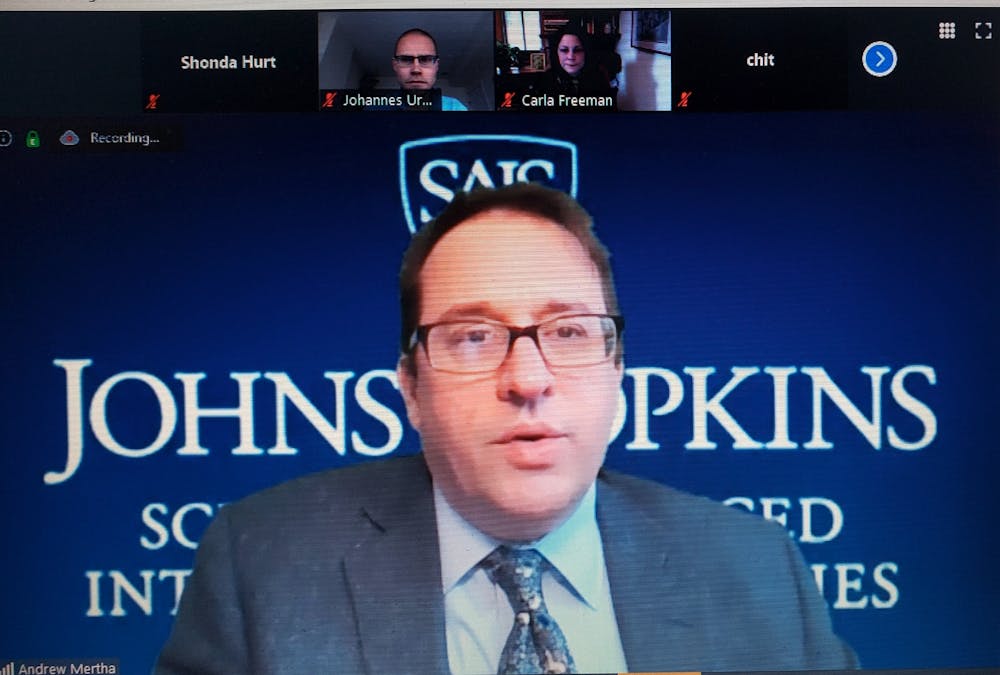The Hopkins School of Advanced International Studies held a webinar titled “The Coronavirus Crisis: Responses in China, Italy, and the United States” on March 26 to discuss responses to the coronavirus (COVID-19) from a global political standpoint.
The webinar featured Carla Freeman, associate research professor of China studies; Erik Jones, professor of European studies and international political economy; and Andrew Mertha, professor of China studies. It was open to the public.
Jones opened the discussion from his residence in Italy. He said that current restrictions on movement will need to last at least a couple more — if not several more — weeks in order to bring the public health situation to a controllable level.
Jones noted that experts will have to balance loosening restrictions with safeguarding the health of the population.
“A particular challenge is managing whether indeed the patience of the population extends all the way into the summer months,“ Jones said. “Because it looks like that’s where we’re headed.”
Mertha spoke about the origin of the virus and the handling of the initial outbreak in China. He argued that the limited spread of information contributed to the severity of the crisis.
“The authorities were punishing various people, including some of the doctors, for spreading rumors when in fact, that was the time when being early was of the essence in terms of informing the general public,” Mertha said.
He also detailed how another major local problem at the beginning of the outbreak was that there were significant numbers of people leaving areas of work in urban settings to join their families outside the city for the Spring Festival in China. The migration increased the spread of the virus nationwide.
Mertha blamed the spread of misinformation to issues of irresponsible government.
“The main point through all of this is the veracity of information. What kind of information is being produced? Where is it being curtailed? Who is it being sent to and what is being done on the basis of that information?” he said.
Freeman lamented that the U.S. and China have not developed a more harmonious relationship through the crisis.
“The two countries have not come together and they are critical in organizing an international response,” Freeman said. “So this is very disheartening.”
According to Freeman, the pandemic should have spurred countries to work together rather than assigning blame to each other. Freeman also spoke to controversial conspiracy theories arising from both countries regarding the origin of COVID-19.
“The two countries have engaged in tit for tat criticisms of each other — many accusing allegations have come from the U.S. about this virus being the product of a Chinese military lab and in turn, a Chinese diplomatic spokesman suggested that the virus might have been brought to China by the U.S. military. So some really nasty interactions between the two sides at a time when one would hope that the two countries would be coming together to address this global crisis.”
The lack of cooperation was not the only cause of concern for the professors. Mertha observed how overall current global efforts to curtail the spread of the virus have been reactionary. He hopes that regardless of political agendas and national goals, governments will put more concrete plans into place.
“One of the things that we’re seeing is that the response has been reactive rather than proactive and it’s unclear to me what has been put into place or what can be put into place that would be more proactive looking forward,” he noted.
With the 2020 elections quickly approaching, Jones highlighted the effects of the pandemic within the U.S.
“We know that there is some preliminary polling data that points to a rally around the flag,” he said. “Nobody wants this government to fail and the most important thing for the United States is that people overcome this crisis, and then we’ll sort out the politics.”





